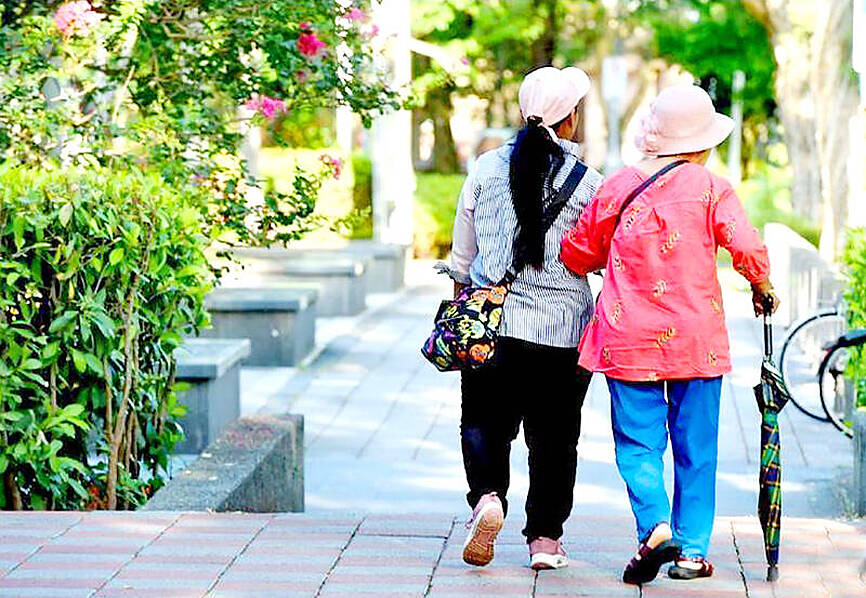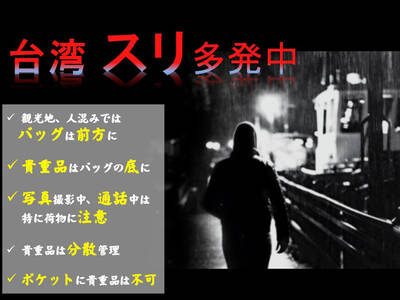Depression, anxiety and sleep disorders are significant risk factors associated with suicide among older adults, but ailments such as cancer, hypertension and peptic ulcers are also risk factors, a National Health Research Institutes study published in the Journal of Affective Disorders on Sunday showed.
National Center for Geriatrics and Welfare Research associate investigator Wu Chi-shin (吳其炘), who led the research team that produced the study, yesterday said that Taiwan’s suicide rates are highest among adults aged 65 or older.
The suicide rates among older adults ranged from 26.6 to 39.9 per 100,000 people in the past decade, higher than the estimated global rate of about 17.6 per 100,000 people, he said, citing Ministry of Health and Welfare data.

Photo: Taipei Times
The study aimed to estimate the population-attributable fraction (PAF) — the proportion of incidents in a population that are attributable to a risk factor — of psychiatric and physical disorders for suicide among older adults, focusing on gender and age-specific factors.
It used data from the National Death Registry and National Health Insurance Research Database, which included 9,136 cases of suicide in older adults, and compared them with 89,439 matched controls — older adults in the same township, of the same gender and with similar demographic characteristics — to assess the risk factors to calculate the PAF.
The study found that sleep disorders exhibited the highest PAF value for suicide among older adults, followed by depressive disorders and anxiety disorders.
The suicide risk from sleep disorders is lower than depressive disorders, but as the prevalence of sleep disorders is much higher, it becomes a higher risk factor for the whole age group, Wu said.
The study found that physical disorders also contribute to suicide risk, such as cancer, hypertension and peptic ulcers, he said.
The team also found that the prevalence and suicide risks associated with osteoarthritis and osteoporosis increase with age, he said, adding that they speculate intolerable pain and limited mobility affect older adults’ quality of life more severely as they age.
If psychological disorders are treated, it might reduce suicide risk by 46.3 percent in women and 34.1 percent in men, while the treatment of physical disorders might reduce suicide risk by 34.2 percent in women and 37.8 percent in men, he said.
Psychological disorders could pose higher suicide risks for women, because the prevalence of depressive disorders and anxiety disorders are higher in the female population, Wu said.
Aside from preventing psychological disorders, maintaining a healthy physical condition can also prevent suicide in older adults, he said.

The Japan-Taiwan Exchange Association has cautioned Japanese travelers to be vigilant against pickpockets at several popular tourist spots in Taiwan, including Taipei’s night markets, the Yongkang Street area, Zhongshan MRT Station, and Jiufen (九份) in New Taipei City. The advisory, titled “Recent Development of Concerns,” was posted on the association’s Web site under its safety and emergency report section. It urges travelers to keep backpacks fully zipped and carried in front, with valuables placed at the bottom of the bag. Visitors are advised to be especially mindful of their belongings when taking photos or speaking on the phone, avoid storing wallets and

ENDORSING TAIWAN: Honduran presidential candidate Nasry Afura said that Honduras was ‘100 times better off’ when it was allied with Taipei The Ministry of Foreign Affairs yesterday said it would explore the possibility of restoring diplomatic relations with Honduras based on the principle of maintaining national interests and dignity. The ministry made the remarks in response to reporters’ questions regarding an article titled: “Will Taiwan Regain a Diplomatic Ally?” published in The Diplomat on Saturday. The article said Honduras’ presidential election in November could offer Taiwan the chance to regain an ally, as multiple candidates have promoted re-establishing diplomatic relations with Taiwan. Honduras severed diplomatic ties with Taiwan in March 2023 in favor of Beijing, but since switching its diplomatic recognition,

A fourth public debate was held today about restarting the recently decommissioned Ma-anshan Nuclear Power Plant, ahead of a referendum on the controversial issue to be held in less than two weeks. A referendum on Aug. 23 is to ask voters if they agree that “the Ma-anshan Nuclear Power Plant should continue operations upon approval by the competent authority and confirmation that there are no safety concerns.” Anyone over 18 years of age can vote in the referendum. The vote comes just three months after its final reactor shut down, officially making Taiwan nuclear-free. Taiwan People’s Party Chairman Huang Kuo-chang (黃國昌) represented

Scoot announced yesterday that starting in October, it would increase flights between Taipei and Japan’s Narita airport and Hokkaido, and between Singapore and Taipei. The low-cost airline, a subsidiary of Singapore Airlines, also said it would launch flights to Chiang Rai in Thailand, Okinawa and Tokyo’s Haneda airport between December and March next year. Flights between Singapore and Chiang Rai would begin on Jan. 1, with five flights per week operated by an Embraer E190-E2 aircraft, Scoot said. Flights between Singapore and Okinawa would begin on Dec. 15, with three flights per week operated by Airbus A320 aircraft, the airline said. Services between Singapore